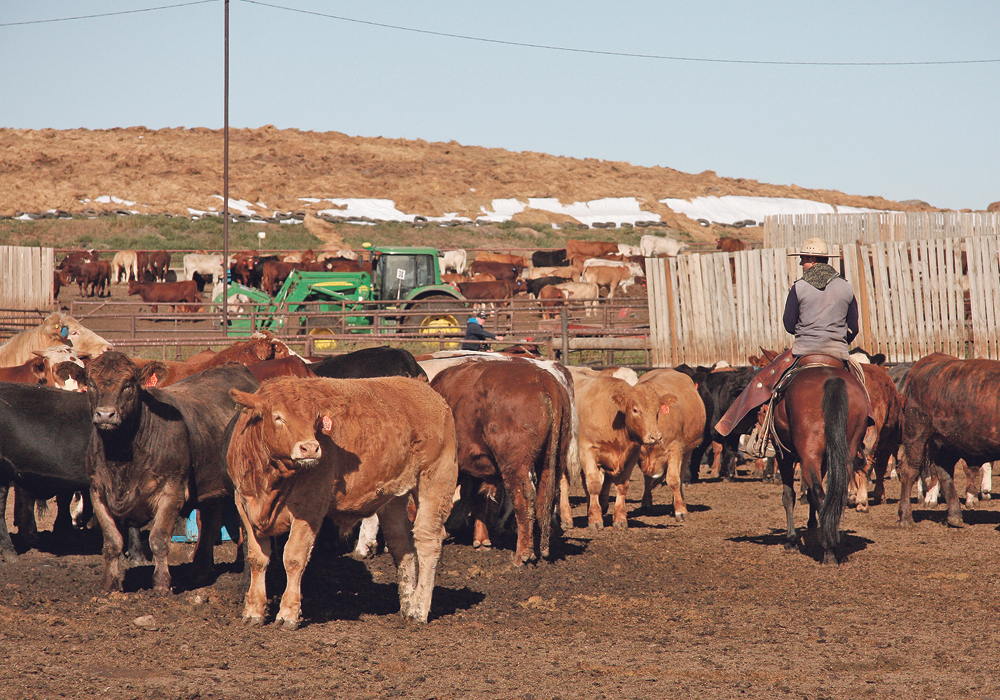Stakeholder groups in the Canadian beef industry are adding their names to the growing list of agriculture organizations concerned over a potential work stoppage at Canadian Pacific Railway.
The Canadian Cattlemen’s Association and the National Cattle Feeders’ Association said today that a service disruption at the country’s second largest rail company would have significant impacts on Canada’s beef sector and would result in an “animal care emergency.”
The groups are calling for CP and unionized workers represented by the Teamsters Canada Rail Conference (TCRC) to resolve their differences and ensure that a rail service interruption is avoided.
Read Also

Saskatchewan dairy farm breeds international champion
A Saskatchewan bred cow made history at the 2025 World Dairy Expo in Madison, Wisconsin, when she was named grand champion in the five-year-old Holstein class.
On March 16, CP officials confirmed that TCRC workers, which include roughly 3,000 locomotive engineers, train conductors and rail yard workers, will be locked out as of March 20 if a labour agreement is not reached.
“We have communicated with both negotiating parties and government representatives the absolute need to have trains continue moving otherwise we will have an animal care emergency on our hands,” said CCA president Bob Lowe in a March 18 news release, issued jointly by the CCA and NCFA.
“We remain hopeful that (the two sides) will reach a resolution and are pleased to see them remain at the negotiating table.”
The well-being of the Canadian cattle feeding industry depends on uninterrupted rail service that’s needed to deliver essential feed supplies, including U.S. corn.
The dependence of western Canadian cattle producers on American feed shipments is greater than usual this year, thanks to widespread drought conditions that affected production of Canadian feedgrains last summer.
A disruption in shipments of American grain “will significantly impact the ability of Canadian beef producers to feed their cattle,” the joint news release stated.
Cattle feeders are already managing feed requirements on a train-by-train basis and there is no buffer in the system,” the news release suggested.
“Any stoppage of trains coming into Canada would be devastating to the Canadian cattle industry,” said NCFA chair James Bekkering.
“We have been dealing with feed shortages over the last few months and are completely reliant on feed coming from the United States,” he added.
“If a stoppage occurs, feed supplies will run out in one to two weeks causing a serious concern for the welfare of our animals.”
In the event that a negotiated settlement is not reached, the CCA and NCFA said binding arbitration and back-to-work legislation should be used.
“It is imperative to prevent the serious consequences that would arise from a shortage of critical feed supplies on Canadian beef operations,” the beef industry groups said.
According to Statistics Canada, the amount of corn imported into Saskatchewan and Alberta rose by 400 percent in 2021.
As of Feb. 1, there were an estimated 1.1 million head of cattle on feed in the two provinces.
It is estimated that one rail car of imported feed grain can sustain approximately 8,000 head of cattle on feed for one day.
Based on that, commercial cattle feeders require nine to ten trainloads of feed per week to sustain their herds.
More than 1,000 super-B trucks of feed would be needed weekly to replace the volume of feedgrain currently being transported by CP, the cattle groups said.
Because that much excess trucking capacity is not available, feeders see no alternative to ensuring that rail service is not interrupted.
Warnings issued by the beef industry are the latest in a growing chorus of concerns as the March 20 deadline for a labour settlement draws closer.
Earlier this week, Saskatchewan premier Scott Moe weighed in on the issue, suggesting a work stoppage would be catastrophic for the province and imploring Ottawa to intervene with back-to-work legislation, if necessary.
TCRC took exception with Moe’s position in a strongly worded news release, also issued on March 18.
“A strike is a legitimate process enshrined in the Canada Labour Code,” said TCRC president Lyndon Isaak.
“In Canada, free, collective bargaining, which includes legal strikes, has advanced the conditions of many workers and continues to ensure development of society in general.”
“Moe’s public intervention on the CPR labour dispute reflects his disdain for the collective bargaining process and ignorance of the issues at hand. He is showing shameful disregard for the 1,200 tax-paying railroaders from Saskatchewan, many of which are included in the 3,000 represented in these current negotiations.”
Contact brian.cross@producer.com
















